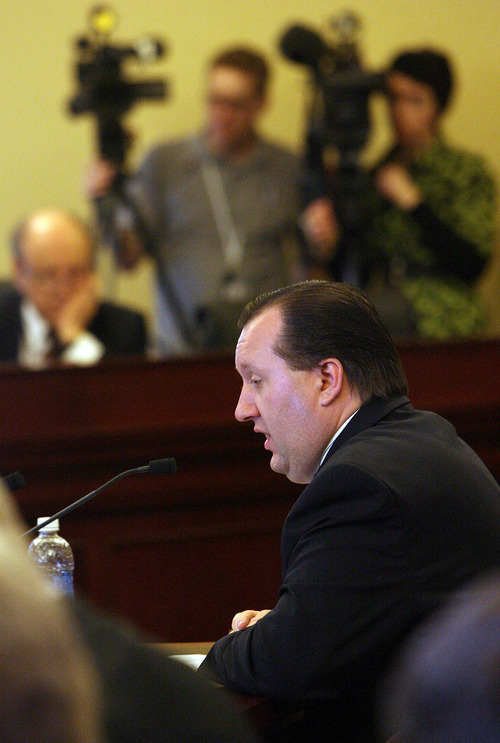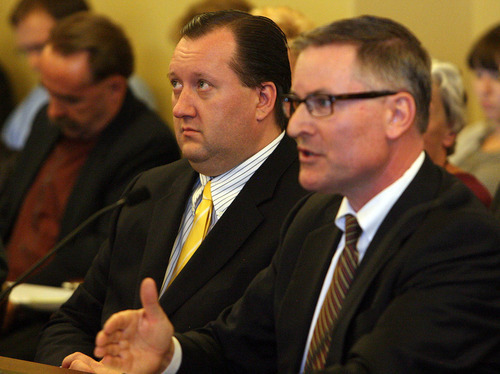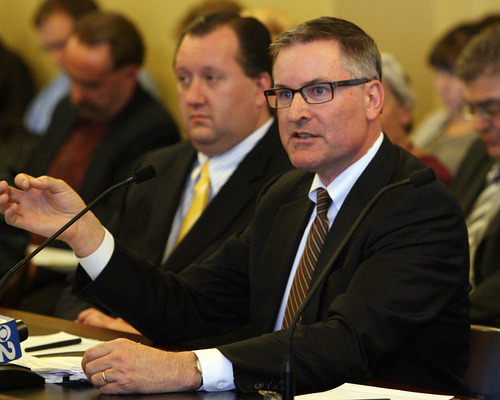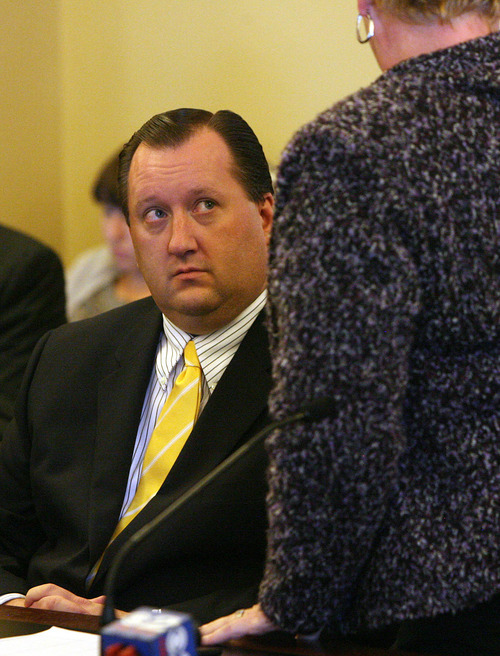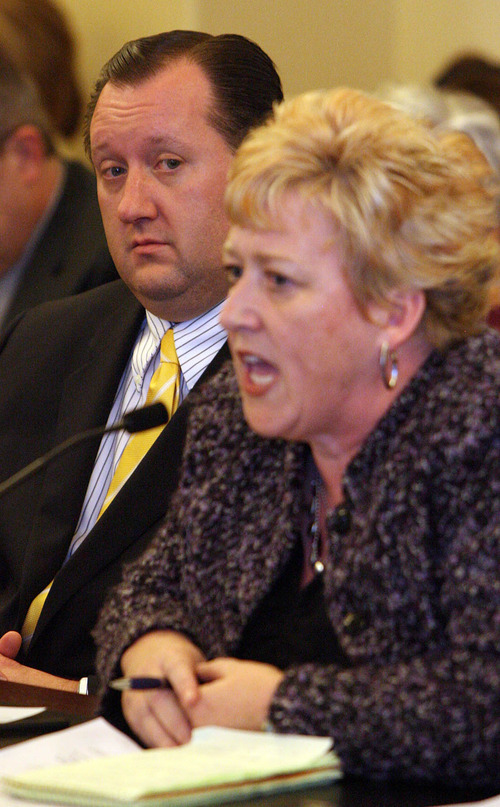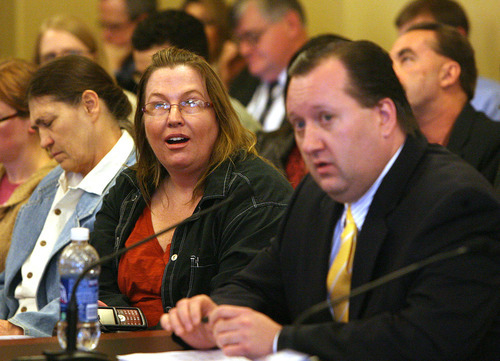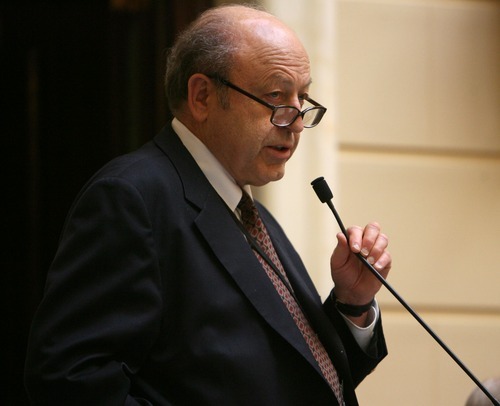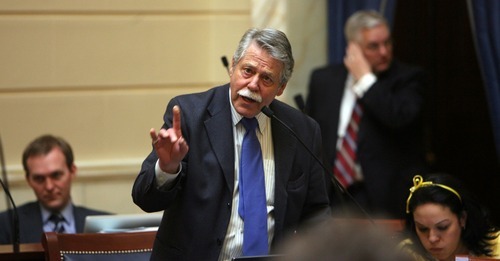This is an archived article that was published on sltrib.com in 2011, and information in the article may be outdated. It is provided only for personal research purposes and may not be reprinted.
The Senate gave final legislative approval Friday to a bill that would shield more records from public release and allow charging more for records that are still available. It came just 72 hours after its text was unveiled, and despite loud protests from the news media.
The Senate voted 21-7 to pass HB477, and sent it to Gov. Gary Herbert — who vowed to "carefully consider" it and "weigh all options" as he decides whether to sign it. The Legislature took the unusual step of having the bill take effect immediately upon the governor's signature, instead of waiting the normal 60 days.
Leaders said they did that — and pushed the bill through quickly — to try to head off an expected onslaught of open-records requests before the bill takes effect. They also acknowledged they wanted to push the bill in a nonelection year when opposition from the media would matter less.
Leaders said a main reason for the bill is they feel the media is abusing the Government Records Access and Management Act (GRAMA) to embarrass government officials.
"We're seeing a proliferation of requests that, frankly, are nothing more than fishing expeditions to see if they can find something that will embarrass a particular legislator," Senate President Michael Waddoups, R-Taylorsville, told reporters.
He said the changes in the bill are not meant to keep the media and public away from important and official records.
"We're clarifying what is not a government record: such things as private communication, and electronic personal communications that when the original GRAMA was passed hadn't been invented yet," he said.
Waddoups told reporters frankly that the bill was pushed this year because the bill has a better chance to pass in a nonelection year when protests from the media may matter less.
"We have to do it now to get it passed," Waddoups said. He added that he told the Utah Press Association that lawmakers will work with it on any problems, and fix them next year.
When asked why lawmakers instead did not talk to the media about the bill before drafting and passing it, Waddoups said, "Actually, we did. There was a fairly extensive discussion this morning." Also, he said, the Legislature has studied issues surrounding GRAMA for years.
Sen. Lyle Hillyard, R-Logan, the Senate sponsor of the bill, told the Senate, "The longer this goes, the more misinformation there is out there" from the media, so moving quickly was needed.
He added that it is difficult to make any change to GRAMA because it always "invites all the press to cry, 'The sky is falling, the sky is falling.' "
Between when the bill may take effect and when any fixes are made next year, lawmakers will redraw political boundaries this summer. When Waddoups was asked if the bill would shield from release communications about redistricting, he said, "Until you raised that issue, it never crossed my mind … I'll give you my personal assurance that it won't."
Waddoups also acknowledged that the bill was pushed quickly to head off an expected onslaught of GRAMA requests as lawmakers finish their session and before the new bill would take effect.
"The sooner we get this one done, the less logjam it will cause," he said. He complained that GRAMA requests filed over a year have caused 400 hours of work time by legislative staff to prepare.
"Just today, we have already received three GRAMA requests that are starting to jam up our staff and reduce their ability to do work that needs to be done," he said.
When asked if making the bill effective upon signature might force the media to file even more requests now during the legislative session before the bill becomes law, Waddoups said, "I guess that depends on the responsibility of the press."
Despite attacks in ads and editorials by the media, Waddoups said he did not think most people oppose the bill. "The concerns I am seeing are from members of the press, not my constituency," he said.
Jeff Hunt, lawyer for the Utah Media Coalition, told a Senate Rules Committee hearing on Friday that the bill "tilts the playing field far to the side of government secrecy."
He said while most states are ensuring that their open-records laws include releasing texts and other forms of electronic messaging, the bill would exclude them. "Utah would be the only state in the nation to take this extreme step."
Sen. Pat Jones, D-Holladay, was among few lawmakers who spoke against the bill.
"I think this swings the pendulum so far the other way" toward secrecy, she said, adding she was concerned it happened too quickly. In the Rules Committee, she asked the sponsor, Rep. John Dougall, R-Highland, "What's the rush?"
He responded, "What's the delay?" He said legislators had looked at forms of the bill for four years, and it had been studied by task forces and study committees.
But Jones said few people saw it this year until 24 hours before a House hearing on it. The House then passed it the next day, and the Senate passed it the next. Hunt said that quick moving with little consultation abused the normal legislative process.
Sen. Chris Buttars, R-West Jordan, said, "I find the rush disturbing," and also opposed it. Senate Minority Leader Ross Romero, D-Salt Lake City, said lawmakers should have discussion and fix policy before passing a law, instead of passing it first and fixing it later.
Everyone who testified at House or Senate hearings on the bill — from the media and watchdog groups — opposed it. But it flew through the Legislature anyway.
The Utah Media coalition took out full-page ads in the state's major newspapers Friday attacking the bill.
It complained that all text messages would be kept secret under the law "regardless of whether public officials are conducting official business."
It also said the law "would allow government to charge prohibitive fees for access to public information. Government officials could tack on charges for indirect and administrative costs, allowing them to set rates that discourage citizens from seeking public information."
Also, while lawmakers say GRAMA requests bog down their staff, the news media ad said, "What they don't say is that the staff is really bogged down because they are researching and writing bills that never even make it to the full Legislature. Of the more than 1,000 bills that were introduced this session, less than half of them will make it into law. Who is really fishing here?"


